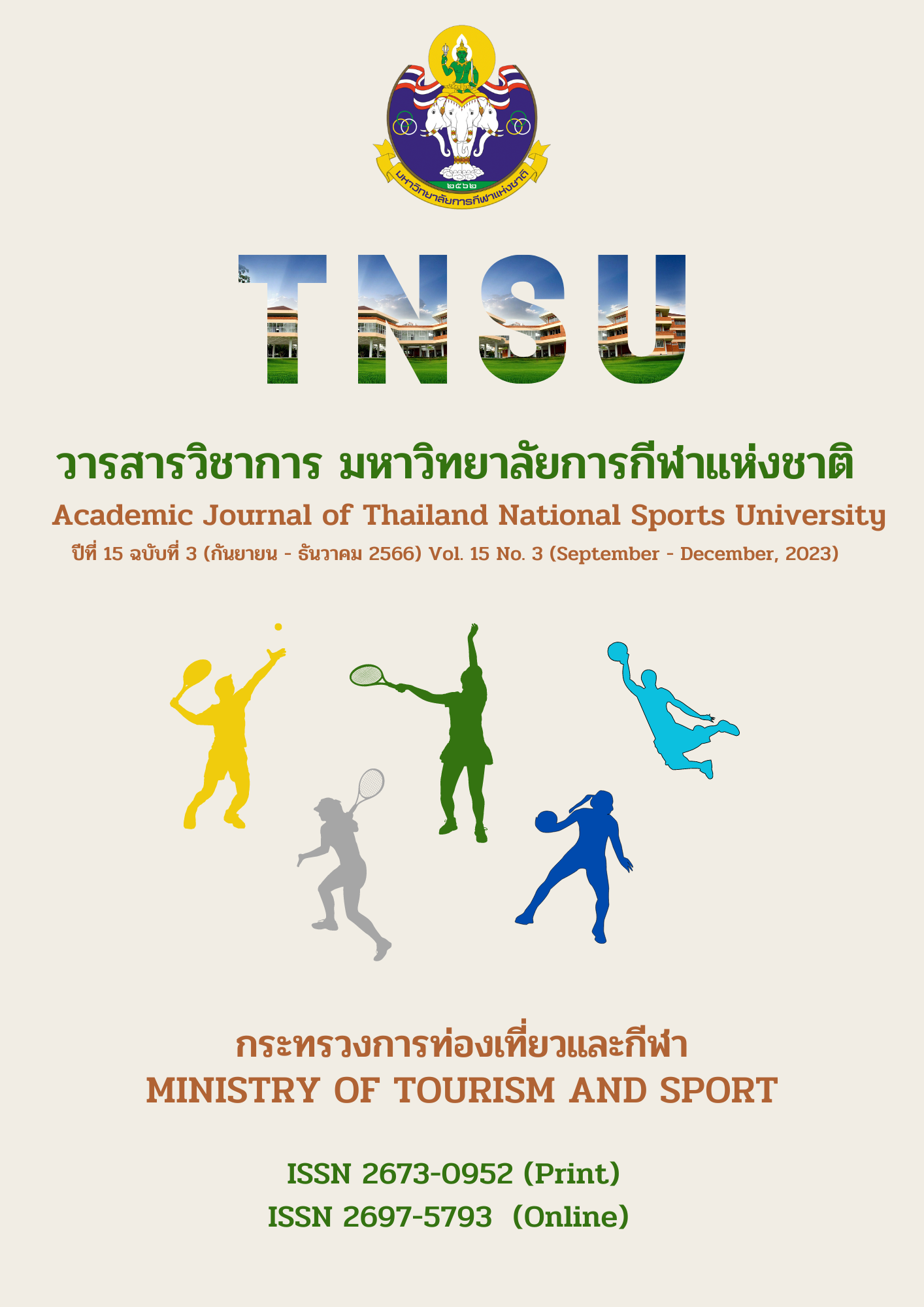PHYSICAL ACTIVITY PROMOTION PROGRAM DURING COVID - 19 PANDEMIC USING ECOLOGICAL FOR UNDERGRADUATE STUDENTS
Main Article Content
Abstract
Purposes: 1) To compare the mean scores of physical activity knowledge and physical activity behavior before and after the experiment of the students in the experimental group who received the physical activity promotion program by using the ecological model. and the students in the control group who did not receive physical activity promotion program by using the ecological model, 2) To compare the mean scores of physical activity knowledge and physical activity behavioral after the experiment between the experimental group and the control group. Method: The subjects consisted of 50 undergraduate students, divided into 2 groups with a matching method, 25 students in the experimental group and 25 students in the control group. The research instrument was the program to promote physical activity in the situation of the COVID - 19 epidemic using an ecological model consisting of 8 activities: 1) YOU KNOW 2) YOU CAN 3) Fit at Home: Body weight 4) Fit at Home: Yoga 5) Fit at Home: Games 6) Fit at Home: Dance 7) Fit at Home: Walk and Run 8) Fit at Home: With IOC of an 0.95, and the data collection instruments included a physical activity knowledge measurement form and physical activity behavior assessment form with IOC of 0.8 and 1, reliability of 0.81 and 0.81, respectively. The duration of the experiment was 8 weeks. 3 days a week, 40 minutes a day, The data were analyzed by mean, standard deviation and t - test. Results: The research findings were as follows: 1) The mean scores of physical activity knowledge and physical activity behavior scores of the experimental group were significantly higher than that before the experiment. 2) The mean scores of physical activity knowledge and physical activity behavior of the experiment group after the experiment were significantly higher than that in the control group at the .05 level. Conclusion: Physical activity promotion program in the situation of COVID – 19 epidemic by using ecological model affected knowledge of the physical activity and physical activity behavior score of graduate students.
Article Details

This work is licensed under a Creative Commons Attribution-NonCommercial-NoDerivatives 4.0 International License.
The published article is a copyright of the Academic Journal of Thailand National Sports University. The passage appeared in each article in this academic journal is a perspective of each author which is not related to the journal. Each author is required to be responsible for all components of his/her own article. If there are any mistakes, each author must be responsible for those mistakes on his/her own.
References
Anothai Palitnongiat, Piyawan Seupwiset, Aorapan Kannung, Kanokpan Srisoi, Rohaya Matda, Wilaipan Boonrod, & Maneerat Saeseu. (2018). Factors related to exercise behavior of physical therapy students in Huachiew Chalermprakiet University. Huachiew Chalermprakiet University.
Chalothron Siangsai. (2015). Factors related physical activity of higher education institutes students in Bangkok Metropolis. Journal of Sport Science and Heal, Chulalongkorn University, 16(3), 63 - 75.
Department of Health. (2018). Physical activity. Department of Health. Retrieved from https://bit.ly/3hqqTML
Glanz et al. (2015). Ecological model of health. Health Behavior, 2(6), 44 - 49. Retrieved from https://bit.ly/3hEKQ2j
King K. M. (2018). Increasing physical activity using an ecological model. ACSM’s Health & Fitness Journal, 22(4), 29 - 32.
Mustopa Shi. (2017). The effect of social ecological model and stage – base workplace health promotion program on blood lipid control behaviors and total cholesterol in employees of the electricity Generating Authority of Thailand. Community Nurse Practitioner. Songkla University.
Office of the Higher Education commission. (2020). Statistics of Higher Education commission. Retrieved from http://www.info.mua.go.th/info/
Pannee Panthewan. (2017). Ecological model and health behavior change. J Royal Thai Army Nurses, 18(2), 7 - 15. Retrieved from https://bit.ly/3B8lf9B
Rungphetch Homsuwan & Thanach Kanoktate. (2018). The ecological model: The control and prevention of hand foot mouth disease in children by multiple factors Influencing. Journal of Nursing and Health Sciences, 12(3), 21 - 29. Retrieved from https://bit.ly/2VDqnCk
Sallis & Owen. (2015). Ecological Model of Health. Health Behavior and Health Education. Retrieved from https://bit.ly/2VCPjtE
Thailand Physical Activity Knowledge Development Centre. (2020). Activity for healthy. Retrieved from https://pathailand.com/paper/8
World Health Organization. (2018). Global action plan on physical activity 2018 - 2030. Retrieved from https://bit.ly/3hEjMQO
World Health Organization. (2020). Global physical activity questionnaire. Retrieved from https://bit.ly/3hGDcof


